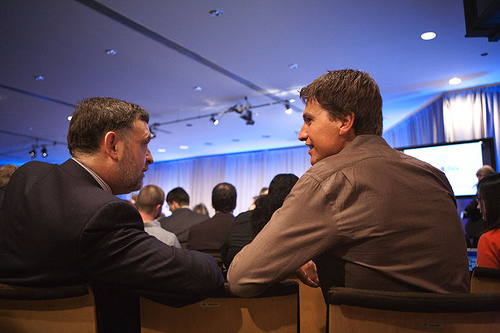Access to participation: what does it mean for learning?
Last week I gave a presentation at the Web4Dev conference in New York about Access to Participation. The point I wanted to make is that while access to information is essential for development (this was the theme of the session I was presenting in), what we should really be aiming for is enabling access to participation. In other words, we need to exploit the emerging participatory culture in society that wants to create and share information, and not only consume it.

At the Web4Dev conference in New York
There is a wealth of information at the “bottom of the [media] pyramid” — the audience that traditionally receives information, but doesn’t get to also share local information laterally or upwards, using media. While community newspapers and radio have enabled a degree of lateral and vertical movement of local information for some years, the increasing prevalence of social media that enables a culture of participation is changing the dynamics of information flow and the power of local voice.
My presentation is online at Slideshare and the video of me giving it is on YouTube (I start speaking at 1 min 40 sec, but the video ends before my presentation ends). View it to learn more about participatory culture and how it looks in the developing world, under the themes of contribution, involvement, connectedness and conversation, all largely enabled by cellphones.
My work at the Shuttleworth Foundation is about understanding and leveraging the effects of technology and cultural changes for teaching and learning in the 21st century. Outcomes-based education (OBE) is predicated on a constructivist learning approach, where learners make meaning through exploration and creation (project-based learning is common). There is thus an obvious opportunity to link the activities of a participatory culture with a participatory learning curriculum.
Educators and parents are no longer the gatekeepers of information. It
is important for youth to develop the skills — such as the twelve
competencies set out by Project New Media Literacies at MIT — that are
necessary to play, work and live in an information-rich and connected
world. These are the skills necessary to fully participate in society in the 21st century.
Much of what is written about participatory culture in America is very much based on rich multimedia creations: blogs, videos, wikis and photo-audio-video sharing activities. In my presentation I showed that participation in the developing world looks different (but that the desire and benefits to participation are the same).
The dialogue that I would like to begin concerns participatory teaching and learning in South Africa. These are some of the questions that we need to consider:
- What does participatory culture amongst youth, e.g. the MXit phenomenon, mean for teaching?
- How can educators effectively leverage the activities happening in popular culture contexts to improve teaching? (Notice that I don’t ask Can educators … but rather How can educators …. This is because I firmly believe that it can happen; it simply requires time and effort to explore this space to find the answers. In fact, I believe that exploring this space is crucial to narrowing the disconnect between learners’ lives in and out of school; a disconnect that is making education increasingly seem irrelevant to youth.)
- What changes are needed in teaching practices, and in the mindset of teachers, to make teaching more participatory? From changing the layout of the classroom to relinquishing the expert-novice perspective, changes are necessary.
- How can social media, such as MXit, be used to give learners a voice? How can that voice, and the literacies developed in the exercising of that voice (visual, information, transmedia, etc.) be evaluated?
- How can digital media learner creations and activities be tied to the curriculum? In what way does the curriculum need to be changed to recognise the new media literacies?
- What information is in the hands of learners that, if allowed to surface in a participatory way, is useful to educators and other learners? How can this information be gathered, shared, aggregated or filtered? For example, performing a discourse analysis on aggregated MXit chats in the week leading up to exams may provide clues to the issues that learners are grappling with. We may realise that fractions are something that learners just don’t get, and as a result revise those before the maths exam.
- Peer-to-peer learning holds much potential to compliment and support an already strained education system. How can participatory culture support peer-learning, using social media?
These are big questions, and by no means the only ones in this dialogue. The sooner we begin to engage with them the better. Through popular culture, participatory culture is happening whether School likes it or not. We urgently need to begin the dialogue around how to best deal with it in a way that supports the goals of Education.
Some blog coverage of my presentation, and the other two presentations in the afternoon’s session track, is at:
- Web4Dev: Innovation track, Day 1
- Thoughts and Talks at web4dev



